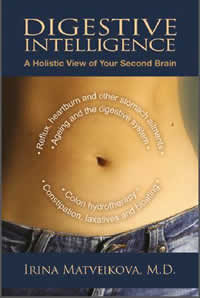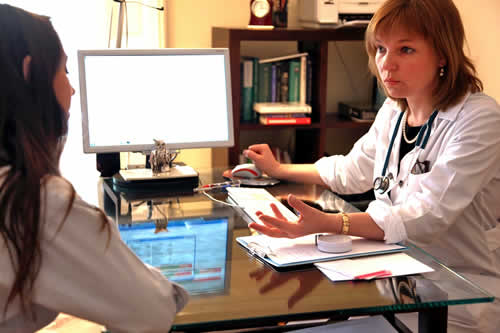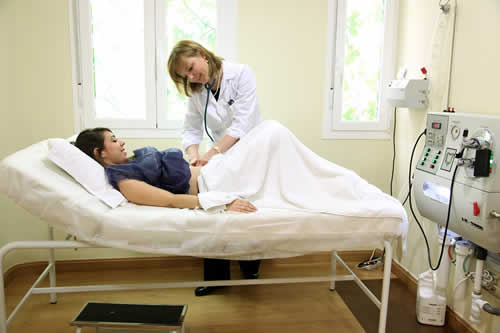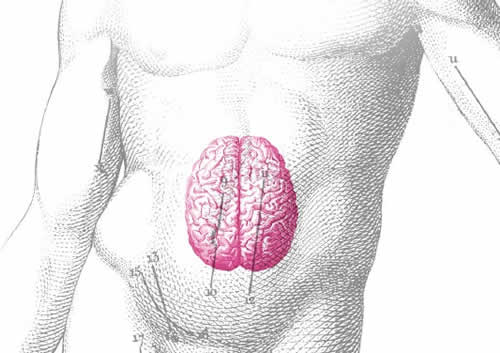Positive Health Online
Your Country

Our Second Brain and Digestive Intelligence
by Irina Matveikova(more info)
listed in colon health, originally published in issue 216 - August 2014
Remarkable as it may sound to you - our digestive system has a very sophisticated design, complexity and intelligence! It acts independently and so specifically in every single person that we professionals, are regularly surprised by its behaviour. The digestive tract has always been overlooked and almost ‘discriminated’ against; treated as some less important part of the body because it appeared to be very primitive and basic in its functions. The gut was frequently considered be totally unattractive, dirty and an object of shame.
The general public used to ignore the digestive system and treat it as ‘must function’ in spite of everything thrown its way - from a bad diet and lifestyle, to abuse of alcohol, medications, smoking and drugs; until the stomach would protest and manifest extreme symptoms of pain, bloating, diarrhoea and many other problems.
So then it had to be ‘shut down’ with symptomatic treatments. People did not pay much attention to digestive discomfort; removing this temporary upset was sufficient and they never looked more deeply into the reasons behind their own digestive rebellions. Hopefully, and thanks to the last 20 years of medical research, we have changed our vision and our knowledge about digestive functions. This precious system was finally plucked from obscurity and is now positioned in its rightful place and attracts a lot of attention from scientists.
We have a true second brain in our guts; its neuronal function is very similar to the brain in our heads. Inside our belly is an extensive network of neurons located between the two muscular layers of the walls of the digestive system. Moreover, the structure of these digestive neurons is identical to that of the neurons in the brain; both produce similar chemical molecules, neurotransmitters and hormones, which are mostly necessary for our intercellular communications and the correct functioning of the entire body. In medical science our second, digestive, brain has a name: the Enteric Nervous System (ENS).
According to new data, the total number of neurons (brain cells) found in our ENS is more than one hundred million. This figure represents a considerably higher number of neurons than in the spinal cord, for example. The brain in our gut is the main production line and storage centre for many neurotransmitters. These substances regulate our moods and our emotions, physical and our psychological wellbeing.
The presence of such a wide variety of neurotransmitters in our intestines is a clear indication of the complexity of the rich digestive language that is spoken from our gut and of its ability to carry out neuronal functions and express its own emotions.
In 1999 it was revealed that 90 percent of serotonin (the famous ‘happiness’ hormone) is produced and stored in the intestinal walls! Only the remaining 10 percent of the body’s serotonin is synthesized in the neurons of the central nervous system - the cerebral brain - or our ‘higher brain’.
The minimal amount of serotonin in the higher brain is, nevertheless, of vital importance to human beings. It performs various functions including regulating our ‘good’ moods (that calm, relaxed sensation and feeling of wellbeing), sleep, and muscular contractions. It also intervenes in cognitive functions such as memory and learning. Serotonin is the ‘messenger of happiness’, and we do, indeed, have a sea of this substance stored in our digestive system. If we could just learn how to utilize and to mobilize the tremendous neurological and hormonal potential of our gut!
So, how can we take advantage of this valuable resource and make the best use of it for our mental and digestive health?
This is a truly challenging task for researchers. That is why scientists and the pharmaceutical industry are currently devoting so much of their research and testing to Neurogastroenterology - a new branch of medicine that studies our Second Brain and its role in health and diseases.
Each of us from time to time has a ‘gut feeling’, a warning that comes from deep inside and can often appear in intense or extreme emotional situations. This is our second brain talking to us. It said that our second brain is more authentic, more sincere and more connected to our true inner feelings than the cerebral brain; and, furthermore, is the more rebellious one of the two. It evades any social influences, logic and our even own mental powers. If our gut nervous centre suffers neurosis, then it’s clear we should definitely not ignore it and, indeed, we cannot afford to do so because it sends us signals about our true state of health and mind.
Additionally, it is the centre of our intuition, premonition, control, fear, hidden obsessions, etc. Our digestive neurological language can present itself as a whole range of sensations: from a pleasurable thrill to a nervous knot, a hollow feeling, or a pain. So we had better stop for a while, to analyze its message and to correct the problem. The digestive system has great plasticity and capacity for recuperation and would be truly thankful - in only two-three days - for a more careful diet, good sleep, relaxation and a basic balancing of your lifestyle. We can afford this short break and self-care, can’t we?

In my book, Digestive Intelligence, you will find many tips about how to detoxify your gut and liver, how to organize your detox diet, to nourish your systems and even how to breathe correctly. I do encourage you to learn to interpret your gut signals and to understand the origin and mechanisms of your stomachs upsets and try to correct and to control them in a preventive and holistic way.
Although Western medicine has only recognized the ‘second brain’ recently, in Eastern medicine the belly has long been viewed as the vital centre of the human organism. Traditional Chinese medicine recognizes the gut as ‘the centre of energy, the sea of qi’. Qi is the vital energy, force, or impulse. In contrast to the energy controlled by willpower or ‘doing’, the qi in the belly is felt and allowed to come. Ideally, we should be in contact with this centre (the gut itself) and concentrate on its energy.
In Japanese martial arts, the hara represents the belly, man’s centre of being, the sea of qi. To be hara-centered is equivalent to an optimal state of health and integration of all the bodily systems, longevity, and wellbeing. It leads to a general state of serenity and profound calm, awareness, reason, personal power, and balanced action.
Those with weak hara have fragile health, get angry and lose their temper easily and, when faced with adversity, they quickly lose their self-control. The expression ‘to be centered’, or in contact with our internal energy, has a lot to do with having a balanced and healthy digestive system, in the language of Western medicine.

Irina with Patient
Once again I would like to emphasize that there is a direct connection between the psyche and the stomach. Many intestinal problems can be explained by the malfunctioning of the intestinal brain, or by interferences in its communication with the higher brain. The gut brain is where fear, anxiety, or phobias originate, along with excessive control or obsessions, and also premonition, apprehension, and intuition. Scientists consider that the abdominal brain can also memorize certain emotions, childhood traumas, experience stress, and suffer its own psychoneurosis.
Nowadays we know that there is constant communication between the two brains: the one inside our skull and its brother down there in our gut and the influence travels in both directions. I can assure you that the relationship between the two brains, which involves hormonal, metabolic, and emotional levels, is very complex—we could even call it intellectual; it is also normally quite democratic and mutually respectful.
And now we are about to discover even more secrets about our digestive world.
New and astonishing scientific news reveals how our intestinal microbiota (the universe of bugs that lives inside our belly) influences all the functions of our entire body.
So much so that Digestive Intelligence can now be interpreted as a gut-brain-microbiota axis!

Mounting evidence is suggesting that particular aspects of human health and disease may be attributed to the trillions of microbes that inhabit our gastrointestinal tract, collectively referred to as the gut microbiota. We have more microbes in our body than the amount of our own cells. Or, put another way, we could even consider ourselves more bacteria that human! Our dependence on our ecology and the universe of bugs that cover us from inside and outside is vital.
So the microbiota associated with the human body are now being intensively studied in both aspects: as a risk factor for disease and a modulator of health and ageing. The organisms that live inside our innards contribute not only to each others function and survival but humans have evolved to depend on the extensive physiology and metabolism that microbiota provides. The power of the gut bacteria in regulating human health cannot be overestimated.
Consider this: the number of unique genes contributed by our gut inhabitants is greater by 150-fold than that encoded within the human genome. The human body uses the sequences of bacterial genomes for its own metabolic, regenerative, immune and nutritive needs. We cannot live a healthy, or a long life without the help of our bacterial universe. Mapping of the bacterial genome of each person can give us information about their health risk of different diseases, body weight and longevity tendencies and even character. Pretty soon we will have our own bacterial identification code, which is going to be a unique digital signature. And medical genetic engineering will begin to use the extended genome of our gut microbiota for future treatments, which will bring about a quantum revolution in modern medicine.

However, digestive pathology is already growing at such an incredible speed in our Western world that currently every second adult suffers from digestive troubles. How we can stop this fast-track growth? What do we need to learn, in order to put the brakes on this rapidly spreading epidemic? It is already becoming clear to many of us that stress, tension, never-ending work and responsibilities exhaust the body and the mind and cause the systems of the body to start to fail; beginning primarily with the digestive and psychological functions.
So what realistically can we do? To stop the world and change our lives seems impossible. Medications don’t appear to be the solution to everything, either. Current studies and research in biotechnology and modern neuroscience are very important and hold great promise for the medicines of the future but it is early days yet, in terms of their practical application.
In my professional opinion, the future is in education and prevention. Each of us has to discover own health potential, learn how we function and question what is causing our health problems. Let’s be curious about how to care and prevent and how to do things in a very practical and positive way.
No unified formula of diet, exercise or magic pill exists. Instead, we have to be self-aware and regularly perform a technical inspection of our ‘life vehicle’ (our body) by doing the detoxing and nourishment programme that I write about in my books. There, you can learn how your gut directly influences your character, behaviour and even your immune defence system. You’ll also be able to recognize the complexity of your relationship with food and discover more about the different types of intolerances and sensitivities.
You’ll know more about the connection between gut health and allergies, mental disorders, obesity, depression and, even, cancer. We have the internal mechanisms we need for recovery and cure. Our body talks to us and warns us. If we could just decode its signals and take notice of them, then we would be much stronger and healthier.
Welcome, to your own new world of Digestive Intelligence!
Bibliography
www.gutmicrobiotaforhealth.com/
www.scientificamerican.com/article/microbes-manipulate-your-mind/
www.scientificamerican.com/article/ultimate-social-network-bacteria-protects-health/
www.scientificamerican.com/article/gut-second-brain/
Fetrow Charles W. and Ávila Juan R. Complementary & Alternative Medicines. Springhouse Corporation. Springhouse. 2001.
Gershon Michael D. The Second Brain. HarperCollins Publishers. New York. 2003.
Jensen Bernard. Dr Jensen´s Guide to Better Bowel Care. A complete program for tissue cleansing through bowel management. Avery part of Penguin Putnam Inc. 1999.
Johnson I.T. and Southgate D.A.T. Dietary Fibre and Related Substances. Chapman and Hall. 1994.
Joshi Nish. Joshi’s Holistic Detox. Hodder & Stoughton. London. 2006.
Junger Alejandro M.D. Clean. HarperCollins Publishers. New York. 2009.
Kabat-Zinn Jon. Coming to Our Senses: Healing Ourselves and the World Through Mindfulness. Hyperion Reprint edition. 2006.
Kligler Benjamin and Lee Roberta. Integrative Medicine: Principles for Practice. McGraw-Hill. New York. 2004.
Kumar Nagi B. Integrative Nutritional Therapies for Cancer, Facts and Comparisons, San Luis. 2002.
Lagarde Claude. Votre santé se cache au Coeur de vos cellules: découvrez la nutrition cellulaire active. Editions Jouvence. 2008.
Mullin Gerard MD. Integrative Gastroenterology. Oxford University Press. 2011.
Comments:
-
Les Rose said..
The author's profile claims that "She is the author of numerous published articles about digestive health and functional nutrition". Well they are not scholarly ones - she doesn't have a single citation on PubMed. This article starts with some standard facts about the GI system and descends into misinterpretation and fiction, making invalid associations between science and pseudoscience. There is no such thing as `qi' or any other of the various esoteric entities beloved of charlatans. It's fatuous to infer that the population level of neurones is an indicator of intelligence. Of course there are more neurones in the gut than in the spinal cord - the latter is mostly axons not cell bodies. The author needs to refresh her neurology training.
